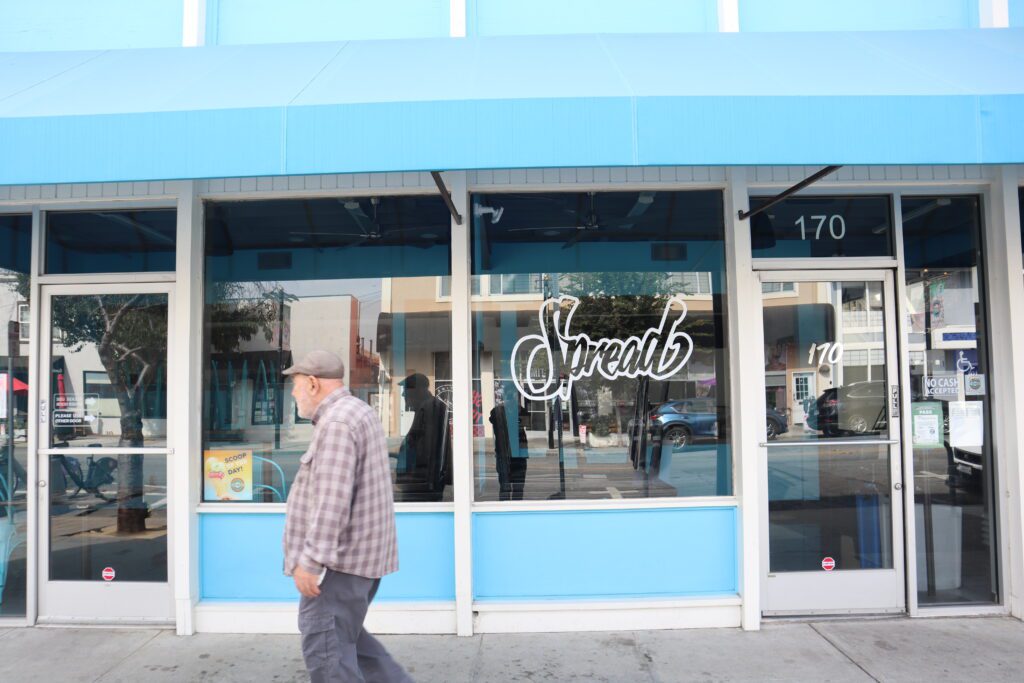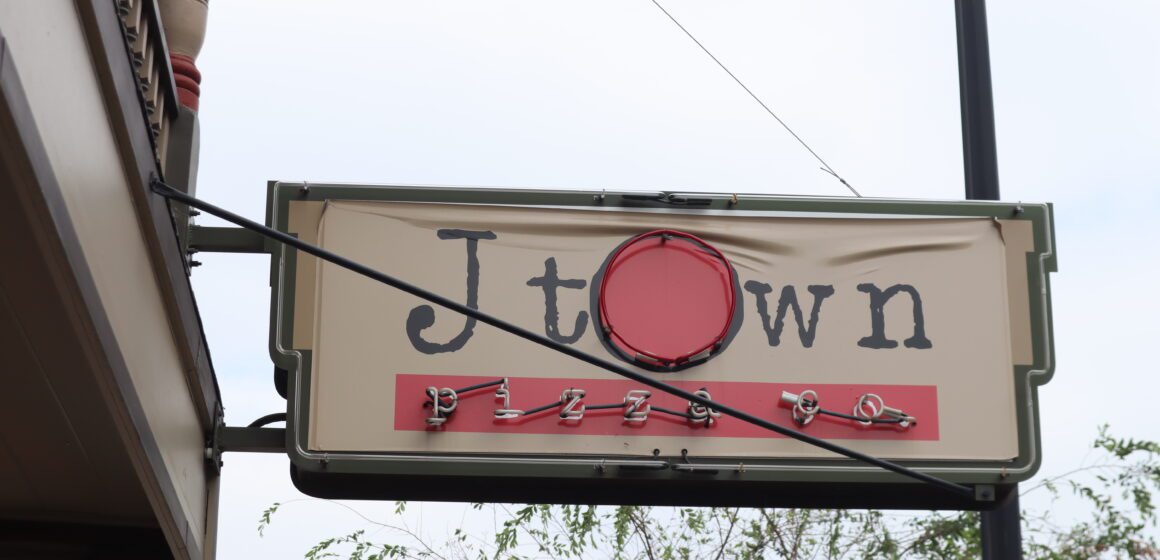Jtown Pizza Co. is shuttering after six years in Japantown, with its owners buried in debt from city red tape over historic buildings. The closure has sparked fears for the family’s financial future and their other businesses in the neighborhood. It has also renewed debate over preservation in San Jose.
Owners Jordan and Rina Trigg announced the closure Wednesday on social media through their company, Dipsomania, Inc. The family also owns Jack’s bar, 7 Bamboo karaoke bar and the sandwich shop Spread, all located in Japantown. They also run neighborhood events like beer and sake walks. The Triggs said ongoing financial hardship makes it impossible to continue Jtown’s operations, despite their best efforts.
“We’re strategically trying to save one business at a time now. But we can’t make any promises, and we don’t think we will be able to save the remaining three or possibly even our house,” Jordan Trigg told San José Spotlight.
The problems started in 2022 after the Triggs acquired three parcels on the corner of Fifth and Taylor streets for $5 million, including the old Cielito Lindo restaurant. Jordan Trigg said they had dreams of opening a new breakfast spot for Japantown. But he alleged that information about the property’s historic status was withheld from them during real estate talks. The historic status forced them to hit pause on renovations and wait out several years of permitting and construction delays while expenses ballooned.
“It kind of just snowballed from there,” Jordan Trigg said. “Instead of cutting our losses we doubled down and tried to make it happen and leveraged our house, leveraged our businesses and tried to hold on. It’s finally caught up to us. Jtown was the first to go because that was the largest building and had the largest overhead.”
Nicole Silva, a resident of the nearby Hensley Historic District, said Jtown Pizza was a neighborhood fixture. When there were no plans on a Friday night, she and her husband went there for a few drinks and dinner. They liked the different sports games playing on the TVs.
“Our next door neighbors are Washington Huskies fans and we’re Michigan Wolverines fans. We watched the national championship game on the Jtown Pizza patio and stumbled home together,” Silva told San José Spotlight. “There were always lots of people. It was a good place to build community.”
The Triggs didn’t necessarily want their struggles publicized. But by late Thursday, a GoFundMe organized by former District 3 Councilmember Raul Peralez had raised more than $21,000 for the couple and their two kids. Peralez was not immediately available for comment.
“Jordan and Rina didn’t want to do this Go Fund Me. They did not want to ask for help. So I’m doing it,” Peralez wrote on the fundraising page.
Tamiko Rast, president of the Japantown Business Association, called the Triggs’ situation “completely devastating.”
“I’ve known Jordan for 20 years and worked alongside him,” Rast told San José Spotlight. “This is just my worst nightmare.”
Rast said this is just one symptom of a larger crisis in the neighborhood.
“The historic designation was not disclosed in the real estate transaction. That little gotcha is why we have 10 condemned buildings in two blocks in Japantown,” Rast said. “If one had any questions as to why there are so many busted buildings here, that is why — the lack of implementation of a very ambiguous historic policy that is causing this.”

Jordan Trigg said the city could learn a key lesson from his family’s ordeal: transparency.
“They instituted this historic resource catalog of over 4,000 properties in San Jose, over 120 alone in Japantown that no one knows about,” he said. “Our house was designated and we had no idea until recently. The city really needs to disclose this to property owners. There’s no value for a realtor to disclose it because it devalues the property.”
State law is vague on the requirement to disclose a property’s historic status during real estate transactions.
Newly-elected District 3 Councilmember Anthony Tordillos represents Japantown and has been in office for just under one month.
“I haven’t personally encountered the issue with property owners not being made aware of their historic home. But I’ve definitely seen all the red tape that comes with owning and operating in a historic property,” Tordillos told San Jose Spotlight.
Buying a home in a historic district can cost thousands more dollars if they perform renovations that aren’t historically accurate. But Tordillos, who lives in a home listed on the city’s historic inventory, said it’s a more significant burden on business owners trying to do renovations.
He said he plans to have his office take a closer look at the problem.
“I think there’s definitely room for improvements on both sides,” Tordillos said. “We should make property owners aware of all these requirements up front, before they’re too far into the planning process or made too much of an investment. I also think there’s room for evolving our historic regulations.”
Tordillos said city laws should strike a better balance between historic preservation and adaptive reuse — encouraging investment and new businesses without eroding the city’s character.
“If we have a current regulatory environment that is just resulting in properties sitting vacant, not being invested in and ultimately falling into disrepair, I think that’s a disservice to historic preservation and a missed opportunity,” he said.
Officials with the city planning and economic development departments did not immediately respond to a request for comment.
 Jordan Trigg said San Jose’s preservation policies are well-intended, but not entirely thought out.
Jordan Trigg said San Jose’s preservation policies are well-intended, but not entirely thought out.
“Now we’re stuck. It might be a little too late for our situation, but hopefully this raises awareness for Japantown that there is a danger of having more and more places shuttered with rising costs and no one able to go back into them or renovate them because of this designation,” he said.
Silva agrees entrepreneurs shouldn’t face steep hurdles due to the historic status of a building. She understands the frustration over the city’s strict policies living in Hensley, where she said any facade changes to her house require multiple steps of approval. At the same time, she doesn’t want to see San Jose’s history erased.
“We have to honor our past, but we can’t get stuck in it either,” Silva said.
Rast said the Triggs once owned businesses outside of Japantown, but eventually sold or closed them to focus entirely on the neighborhood.
“Jordan’s raised his family here — he lives a block away. If you’re going to talk about commitment to a place, he and Rina have that,” Rast told San José Spotlight. “Now they’re being punished for that commitment to this community.”
Contact Brandon Pho at [email protected] or @brandonphooo on X.



Leave a Reply
You must be logged in to post a comment.